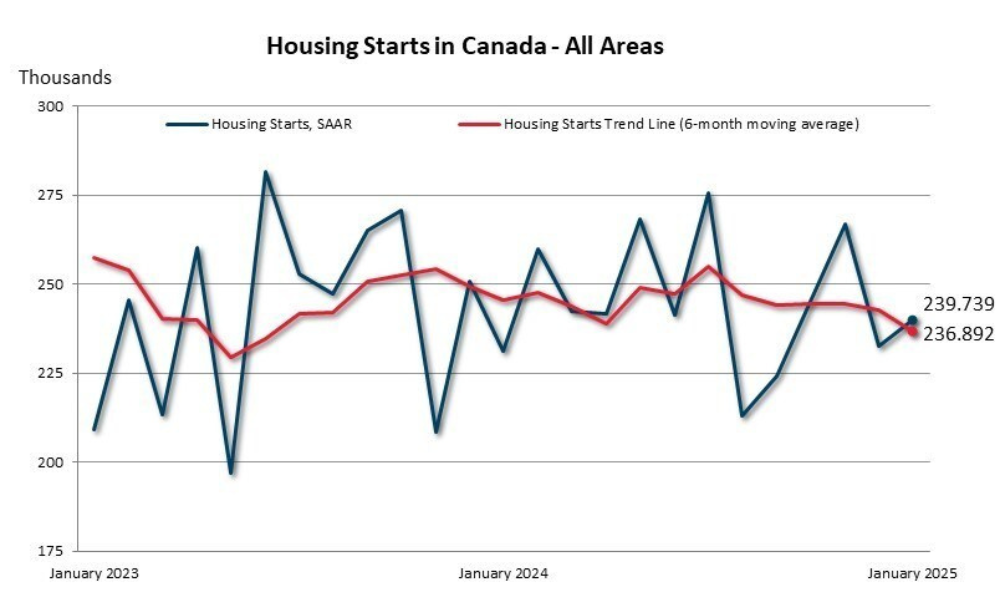A strong start to 2025, but trade tensions and economic uncertainty cloud the outlook

Canada’s housing starts activity picked up in January, but rising trade tensions with the US could cast a shadow over future construction activity.
The seasonally adjusted annual rate (SAAR) of housing starts rose 3% to 239,739 units in January, up from 232,492 in December, according to the Canada Mortgage and Housing Corporation (CMHC).
Actual housing starts in urban centres with populations of 10,000 or more saw an even stronger 7% year-over-year gain, reaching 15,930 units, compared to 14,883 in January 2024.
CMHC deputy chief economist Tania Bourassa-Ochoa said the increase was largely driven by a surge in multi-unit housing starts, particularly in Quebec and British Columbia, where purpose-built rental construction accelerated.

Housing trends in Canada’s largest cities remained uneven, with some markets seeing major gains while others struggled.
Montreal experienced a remarkable 112% year-over-year increase in actual housing starts, CMHC’s report showed. Vancouver also saw growth, with housing starts up 37% from a year earlier. Meanwhile, Toronto recorded a steep 41% decline, driven by a slowdown in multi-unit development.
CMHC also reported that the monthly SAAR for urban centres climbed 3% to 220,643 units, while rural housing starts were estimated at 19,096 units.
Despite the improvement in January’s numbers, the six-month trend in housing starts declined by 2.5% to 236,892 units, reflecting the continued slowdown in construction momentum.
CMHC warned that escalating trade risks, particularly the possibility of widespread US tariffs, could disrupt Canada’s housing market in the coming years.
"While these increases show early signs of progress to begin the year, foreign trade risks add significant uncertainty for housing construction going forward," Bourassa-Ochoa said.
In its 2025 Housing Market Outlook, CMHC projected that housing starts will slow from 2025 to 2027, largely due to a decline in condominium construction as investor demand wanes and young families look toward other housing options.
At the same time, a potential trade war between Canada and the US could have far-reaching consequences for the economy and the housing market. The agency warned that if the US imposes high tariffs on Canadian goods, the resulting increase in inflation could push the Bank of Canada to lower interest rates to support economic growth.
Read next: What would a full-on trade war mean for Canada's housing market?
In such a scenario, a recession could delay Canada’s housing recovery, prompting homebuyers to delay purchases and discouraging new home construction.
While some households might benefit from improved borrowing conditions, the uncertainty surrounding trade policy and its economic impact could make developers hesitant to start new projects.
Make sure to get all the latest news to your inbox on Canada’s mortgage and housing markets by signing up for our free daily newsletter here.



